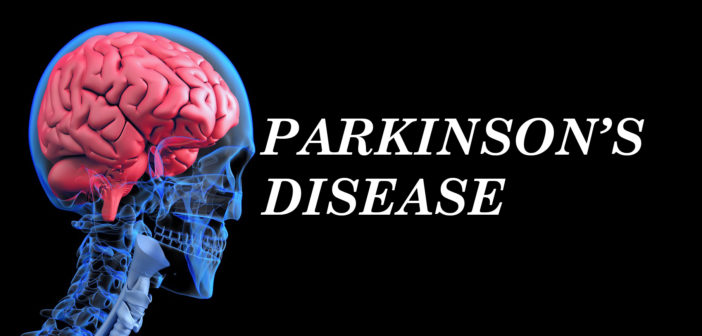Parkinson's disease is a progressive nervous system disorder that affects movement. Symptoms start gradually, sometimes starting unnoticed tremor in just one hand. Parkinson's disease symptoms worsen as your condition progresses over time. Tremors are common, but the disorder also commonly causes stiffness or slowing of movement.
In the early stages of Parkinson's disease, your face may show little or no expression. Your arms may not swing when you walk. Your speech may become soft or slurred. Although Parkinson's disease can't be cured, medications might significantly improve your symptoms. Occasionally, your doctor may suggest surgery to regulate certain regions of your brain and improve your symptoms.
Symptoms
Parkinson's disease signs and symptoms differ from one to another. Early signs may be mild and barely noticeable. Often symptoms begin on one side of your body and usually remain worse on that side, even after symptoms begin to affect both sides.
Parkinson's signs and symptoms may include:
- Slowed movement (bradykinesia). Over time, Parkinson's disease may slow your movement, making simple tasks difficult and time-consuming. Your steps may become shorter when you walk. It may be difficult to get out of a chair. You may drag your feet as you try to walk
- Tremor. A tremor, or shaking, usually begins in a limb, often your hand or fingers. You may rub your thumb and forefinger back and forth, known as a pill-rolling tremor. Your hand may tremble when it's at rest.
- Loss of automatic movements. You may have a decreased ability to perform unconscious movements, including blinking, smiling or swinging your arms when you walk.
- Rigid muscles. Muscle stiffness may occur in any part of your body. The stiff muscles can be painful and limit your range of motion.
- Impaired posture and balance. Your posture may become stooped, or you may have balance problems as a result of Parkinson's disease.
- Speech changes. You may speak softly, quickly, slur or hesitate before talking. Your speech may be more of a monotone rather than have the usual inflections.
- Writing changes. It may become hard to write, and your writing may appear small.
Complications
Parkinson's disease is often accompanied by these additional problems, which may be treatable:
- Thinking difficulties. You may experience cognitive problems (dementia) and thinking difficulties. These usually occur in the later stages of Parkinson's disease. Such cognitive problems aren't very responsive to medications.
- Depression and emotional changes. You may experience depression, sometimes in the very early stages. Receiving treatment for depression can make it easier to handle the other challenges of Parkinson's disease.
You may also experience other emotional changes, such as fear, anxiety or loss of motivation. Doctors may give you medications to treat these symptoms.
- Swallowing problems. You may develop difficulties with swallowing as your condition progresses. Saliva may accumulate in your mouth due to slowed swallowing, leading to drooling.
- Chewing and eating problems. Late-stage Parkinson's disease affects the muscles in your mouth, making chewing difficult. This can lead to choking and poor nutrition.
- Sleep problems and sleep disorders. People with Parkinson's disease often have sleep problems, including waking up frequently throughout the night, waking up early or falling asleep during the day.
People may also experience rapid eye movement sleep behaviour disorder, which involves acting out your dreams. Medications may help your sleep problems.
- Bladder problems. Parkinson's disease may cause bladder problems, including being unable to control urine or having difficulty urinating.
- Constipation. Many people with Parkinson's disease develop constipation, mainly due to a slower digestive tract.
Some other complications are:
- Blood pressure changes. You may feel dizzy or lightheaded when you stand due to a sudden drop in blood pressure (orthostatic hypotension).
- Smell dysfunction. You may experience problems with your sense of smell. You may have difficulty identifying certain odors or the difference between odors.
- Fatigue. Many people with Parkinson's disease lose energy and experience fatigue, especially later in the day. The cause isn't always known.
- Pain. Some people with Parkinson's disease experience pain, either in specific areas of their bodies or throughout their bodies.
- Sexual dysfunction. Some people with Parkinson's disease notice a decrease in sexual desire or performance.
Prevention
Because the cause of Parkinson's is unknown, proven ways to prevent the disease also remain a mystery.
Some research has shown that regular aerobic exercise might reduce the risk of Parkinson's disease whereas people who consume caffeine — which is found in coffee, tea and cola — get Parkinson's disease less often than those who don't drink it. Green tea is also related to a reduced risk of developing Parkinson's disease.
However, it is still not known whether caffeine actually protects against getting Parkinson's, or is related in some other way. Currently there is not enough evidence to suggest drinking caffeinated beverages to protect against Parkinson's.
When to see a doctor?
See your doctor if you have any of the symptoms associated with Parkinson's disease — not only to diagnose your condition but also to rule out other causes for your symptoms. Quickobook is here to help you get the best specialist in your own city.









Comments (0)
No comments yet. Be the first to share your thoughts!
Leave a Comment